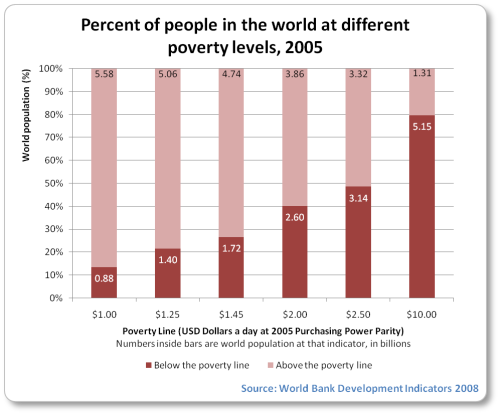
Wednesday, August 12, 2009
|
|
Senior Member
|
|
Join Date: Feb 2009
Location: Islamabad
Posts: 850
Thanks: 902
Thanked 1,291 Times in 524 Posts
|
|

Some Facts- Almost half the world — over 3 billion people — live on less than $2.50 a day.
- The GDP (Gross Domestic Product) of the 41 Heavily Indebted Poor Countries (567 million people) is less than the wealth of the world’s 7 richest people combined.
- Nearly a billion people entered the 21st century unable to read a book or sign their names.
- Less than one per cent of what the world spent every year on weapons was needed to put every child into school by the year 2000 and yet it didn’t happen.
- 1 billion children live in poverty (1 in 2 children in the world). 640 million live without adequate shelter, 400 million have no access to safe water, 270 million have no access to health services. 10.6 million died in 2003 before they reached the age of 5 (or roughly 29,000 children per day).
 In 2005, the wealthiest 20% of the world accounted for 76.6% of total private consumption. The poorest fifth just 1.5%:
In 2005, the wealthiest 20% of the world accounted for 76.6% of total private consumption. The poorest fifth just 1.5%:
Causes of Poverty
Poverty is the state for the majority of the world’s people and nations. Why is this? Is it enough to blame poor people for their own predicament? Have they been lazy, made poor decisions, and been solely responsible for their plight? What about their governments? Have they pursued policies that actually harm successful development? Such causes of poverty and inequality are no doubt real. But deeper and more global causes of poverty are often less discussed.
Behind the increasing interconnectedness promised by globalization are global decisions, policies, and practices. These are typically influenced, driven, or formulated by the rich and powerful. These can be leaders of rich countries or other global actors such as multinational corporations, institutions, and influential people.
In the face of such enormous external influence, the governments of poor nations and their people are often powerless. As a result, in the global context, a few get wealthy while the majority struggle.
__________________
When you have to shoot, shoot. Don't talk. ~ The Good, The Bad, and the Ugly
|